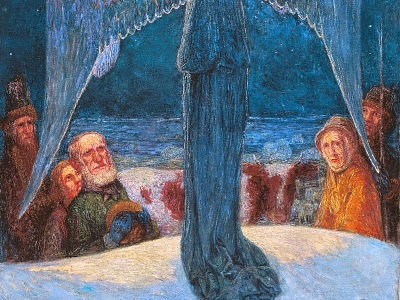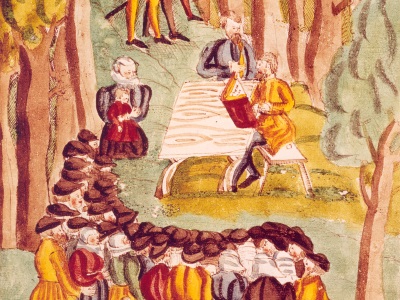The mighty deeds of the future, as spoken by the prophets, fill the message of Christmas. The heavenly messengers proclaim God’s rulership in their triumphant song: “Glory to God in the highest, and on earth peace to those on whom his favor rests” (Lk. 2:14).
Like the angels that first Christmas, the prophets proclaimed again and again the rule of God. Despite the distress of our time, we have lost touch with this prophetic spirit. In fact, the inmost nature of prophecy has become an enigma to us. We do not know its primary source anymore, and therefore we no longer grasp the demands it makes, the task it has, its impact on practical life. As far as we are concerned, the prophetic vision for the earth is a utopian dream. Only a passing fancy might still long for it feebly.
But at any moment the resplendent abundance of prophetic reality can break in upon our poverty and shame. In the prophetic word God’s loving will takes shape on earth. Therefore, the prophets spoke simultaneously about the rule of God and the rule of Christ. In Jesus, the God of the stars and their heavenly hosts will begin his kingly rule on this earth, as it is in heaven (Mt. 6:10).
This God has laid his Spirit in a special way upon the One who is to proclaim justice to the peoples and who will never weary until he has founded righteousness upon the earth (Isa. 42:1–4). The Spirit of God in its unique fullness – the Spirit of understanding and power – shall be upon the Child, so that he can judge the needy and the poor with equity and smite the oppressors with his word (Isa. 11:1–4). His name shall be called, “God is our righteousness,” because this king, like God himself, shall practice justice and righteousness throughout the land (Jer. 23:5–6). “He will judge between the nations and will settle disputes for many peoples. They will beat their swords into plowshares and their spears into pruning hooks. Nation will not take up sword against nation, nor will they train for war anymore” (Isa. 2:4). This king, who will be as powerful and victorious as he will be just and merciful, utterly destroys war chariots, war horses, and war machines. “His rule will extend from sea to sea and…to the ends of the earth” (Zech. 9:10). “For the earth will be full of the knowledge of the Lord as the waters cover the sea” (Isa. 11:9).
Hence Mary, in her glimpse of prophetic certainty, exulted, “He has performed mighty deeds with his arm; he has scattered those who are proud in their inmost thoughts” (Lk. 1:51). It is also this future that Simeon held in his arms: “For my eyes have seen your salvation, which you have prepared in the sight of all people” (Lk. 2:30–31).
The son of Mary, God’s salvation, is the only One in whom the divine Spirit of freedom, justice, and love finds its shape, unbroken and unhindered. Hence, the call to repentance never ends in pessimism, but rather in the certainty that the knowledge of God and the liberation from injustice must go deep and be far reaching. Jeremiah announced, “I will cleanse them from all the sin they have committed against me” (Jer. 33:8). And Isaiah joins in with the jubilant cry, “The ruthless will vanish” (Isa. 29:20). “No longer will violence be heard in your land, nor ruin or destruction within your borders” (Isa. 60:18). “No longer will the fool be called noble nor the scoundrel be highly respected” (Isa. 32:5). It is so simple when in a few short words the prophet Hosea brings to expression the primal demand for this renewal of life: “Maintain love and justice, and wait for your God always” (Hos. 12:6).
This attitude is possible only when a different heart beats within us, different from that which has been in us so far, and when God’s Spirit dwells in us, as Ezekiel promises for these last days (Ezek. 11: 19). If the earth is to be filled with the glory of God, then the triune Spirit must fill and pervade the people who dwell on it. Only when this Spirit gains influence over us, a sovereignty thus far completely unknown, can we expect the social and moral transformation that Mary sings about.
Adapted from Eberhard Arnold, "Prophecy," in When the Time Was Fulfilled (Walden, NY: Plough, 2007), 16–19. The original article, "Prophecy," published in December 1926, can be read in our digital archive.
Article edited for length and clarity.


